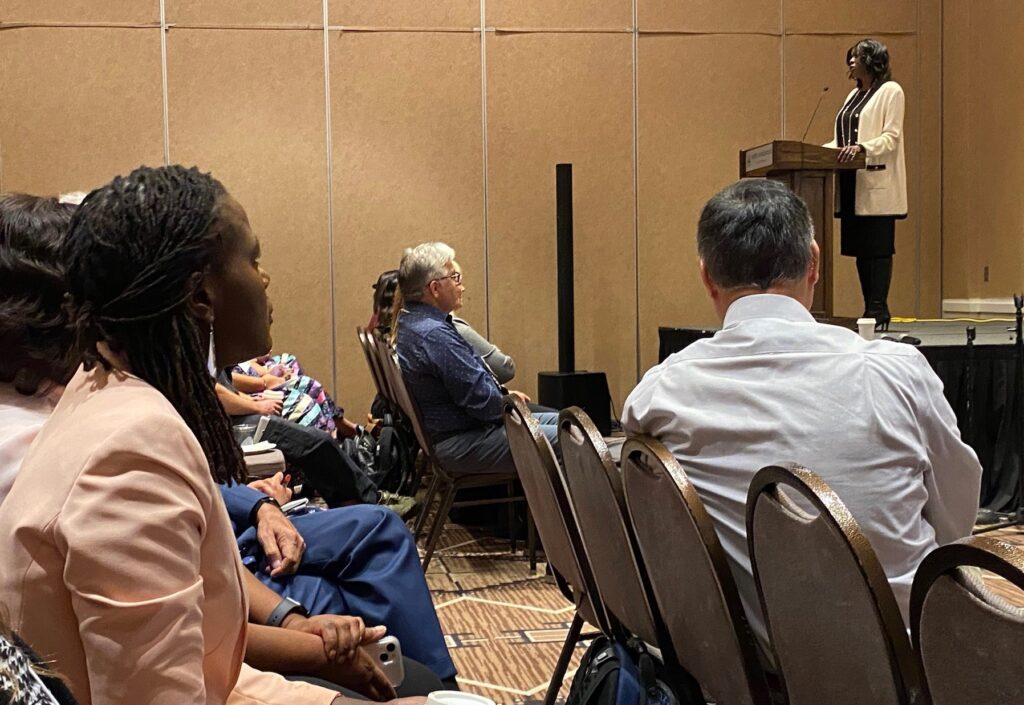At the First American Land-Grant Consortium annual conference, tribal educators learned about a new USDA program that will bring millions to tribal colleges, and discussed the use–and abuse–of Indigenous Traditional Ecological Knowledge.
By Melanie Lenart

With a quarter of a billion dollars on the table to support food and agricultural programs at tribal colleges and other minority-serving institutions, the USDA is pledging to bring more diversity into the federal agency and also support research involving traditional knowledge, calling it “fundable science.”
At the First American Land-Grant Consortium’s annual conference in late October, these opportunities generated excitement, but also concern among the 275 predominantly Indigenous educators and students attending the in-person event in Albuquerque. Questions remain about how to protect the Indigenous Traditional Ecological Knowledge identified as a priority in many federal grant opportunities, including the renewal grants supporting ag-related programs and research at tribal colleges and universities.
“We are at a moment in our history where we have a singular opportunity to improve our collaborations and increase the prevalence of American Indian and Alaskan Native professionals and traditional knowledge in the ag sector,” USDA Chief Scientist Chavonda Jacobs-Young said during a keynote talk on Oct. 23. She also serves as under secretary for Research, Education and Economics.
“$250 million is going to be spent in the next three months on your communities. How is it going to spent?”
Panelists will soon be sifting through grant proposals for the US Department of Agriculture’s NEXTGEN program, which aims to support students with scholarships, internships, and other opportunities designed to increase their interest in agricultural careers. NIFA Program Director Erin Riley urged conference participants to serve as panelists for the proposal reviews.
“$250 million is going to be spent in the next three months on your communities. How is it going to spent?” Riley said. “You have to bring your ideas, your culture, your knowledge to the table. If it’s not there, the money is not going to go where it needs to go.”
Dionne Toombs, NIFA’s acting director, pointed out during her own talk that NIFA will be partnering with the Native American Agriculture Fund to further expand the reach of its programs in tribal communities. The Fund has been working to distribute the $270 million that remained after plaintiffs in a decades-old discrimination lawsuit received their shares of the $760 million awarded in 2018.
NIFA leaders also emphasized the importance of Indigenous Traditional Ecological Knowledge, or ITEK, including in the 2022 renewal process for the four-year grants supporting ag-related education, extension and research projects at the 35 tribal colleges and universities that qualify as land-grant institutions.
“We are also working with all of our programs agency-wide to include ITEK as important research and extension and education criteria,” Toombs said. “There is language being included in all of our requests for applications highlighting that ITEK is important to NIFA and affirming it to be a fundable science.”
Toombs noted that NIFA had participants break into small groups for an ITEK listening session during its Oct. 22 workshop on upcoming funding opportunities.
“Make sure that you’re not signing the rights to traditional knowledge over to another entity”
During the question-and-answer session after Toombs’ Oct. 23 talk, one conference attendee cautioned participants to be wary about signing away author rights when publishing information about Indigenous knowledge in western journals, citing an experience involving the Salish and Kootenai tribes in Montana.
“Make sure that you’re not signing the rights to traditional knowledge over to another entity,” she said. “We wound up in a position where traditional knowledge was published, because there was a chapter on biocultural restoration done, and the publisher laid claim to traditional knowledge even though it’s referenced in the book. They told the tribe they were no longer able to share that information.”
Riley reminded consortium participants that options for protecting ITEK are limited because of the US legal system.
“There is a lot of focus on traditional ecological knowledge right now. And NIFA, our grants, we don’t have a way to keep culturally sensitive data safe,” Riley said. “There’s no policy set in the United States to protect sovereign data. It’s not there.”
For instance, others have noted that taxpayers can make the claim that federally funded projects require transparency, including the potential release of data, using the Freedom of Information Act. The Klamath tribe faced this situation when the US Supreme Court ruled in 2001 that they had to share information collected about their water resources even though there was a Memorandum of Agreement protecting that knowledge.
Riley urged participants to raise the concerns expressed at the conference in future listening session. “We really need input from all of you about ITEK,” she said, noting listening sessions via Zoom were scheduled for Nov. 2, 10 and 14.
Riley has been assisting tribal colleges as a NIFA program director since before the agency’s 2019 move from Washington, DC, to Kansas City, working during times of precipitously low NIFA staffing. At the consortium, Riley introduced three new staff members in her area.
During her talk, NIFA acting directory Toombs made a “big announcement” about an ongoing NIFA expansion. She read out names and invited 18 NIFA staffers to stand up so consortium participants could see them and ask them questions as needed. Many were women, and a third to half were people of color.
“We need to look like the people we serve,” Jacobs-Young said, noting she was quoting US Secretary of Agriculture Tom Vilsack. USDA is supporting projects and tribal colleges and other minority serving institutions to promote “equitable participation of farmers, ranchers and forest landowners in USDA programs and services.”
• • •
Melanie Lenart is a regular contributor to Native Science Report.
Story published October 31, 2022
• • •
Enjoyed this story? Enter your email to receive notifications.
